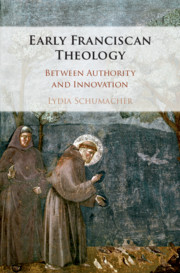Book contents
- Early Franciscan Theology
- Early Franciscan Theology
- Copyright page
- Dedication
- Contents
- Acknowledgements
- Abbreviations
- Chapter 1 Early Franciscan Theology: An Introduction
- Chapter 2 The Franciscan Context
- Chapter 3 The Philosophical Context
- Chapter 4 Theological Vision
- Chapter 5 Theistic Proof
- Chapter 6 The Divine Nature
- Chapter 7 The Trinity: Context
- Chapter 8 The Trinity: Doctrine
- Chapter 9 Christology
- Chapter 10 Incarnation
- Chapter 11 Moral Theology
- Chapter 12 Conclusion: The Promise of Early Franciscan Theology
- Bibliography
- Index
Chapter 6 - The Divine Nature
Published online by Cambridge University Press: 14 June 2019
- Early Franciscan Theology
- Early Franciscan Theology
- Copyright page
- Dedication
- Contents
- Acknowledgements
- Abbreviations
- Chapter 1 Early Franciscan Theology: An Introduction
- Chapter 2 The Franciscan Context
- Chapter 3 The Philosophical Context
- Chapter 4 Theological Vision
- Chapter 5 Theistic Proof
- Chapter 6 The Divine Nature
- Chapter 7 The Trinity: Context
- Chapter 8 The Trinity: Doctrine
- Chapter 9 Christology
- Chapter 10 Incarnation
- Chapter 11 Moral Theology
- Chapter 12 Conclusion: The Promise of Early Franciscan Theology
- Bibliography
- Index
Summary
The doctrine of God remains one of the most fundamental and significant areas of early Franciscan innovation. Since Augustine, medieval thinkers in the West had largely identified ‘simplicity’ as the most fundamental feature of the divine nature. Thus, the doctrine of divine simplicity, now frequently referred to as ‘classical theism’, had been propounded by such noteworthy figures as Hilary of Poitiers, Anselm of Canterbury, Peter Lombard, and Thomas Aquinas, who articulated this doctrine in its mature form.1 Against the otherwise relatively continuous Western tradition of thinking about the general nature of God, this chapter will demonstrate that the Summa Halensis developed a second and separate line of thought on the matter. This new tradition stressed God’s immensity or infinity where the preceding one had emphasized his basic simplicity. In doing so, I would argue, it instigated a fundamental shift in the way of conceiving the nature of God that correlated strongly to Francis’ own theological outlook.2
- Type
- Chapter
- Information
- Early Franciscan TheologyBetween Authority and Innovation, pp. 119 - 142Publisher: Cambridge University PressPrint publication year: 2019



